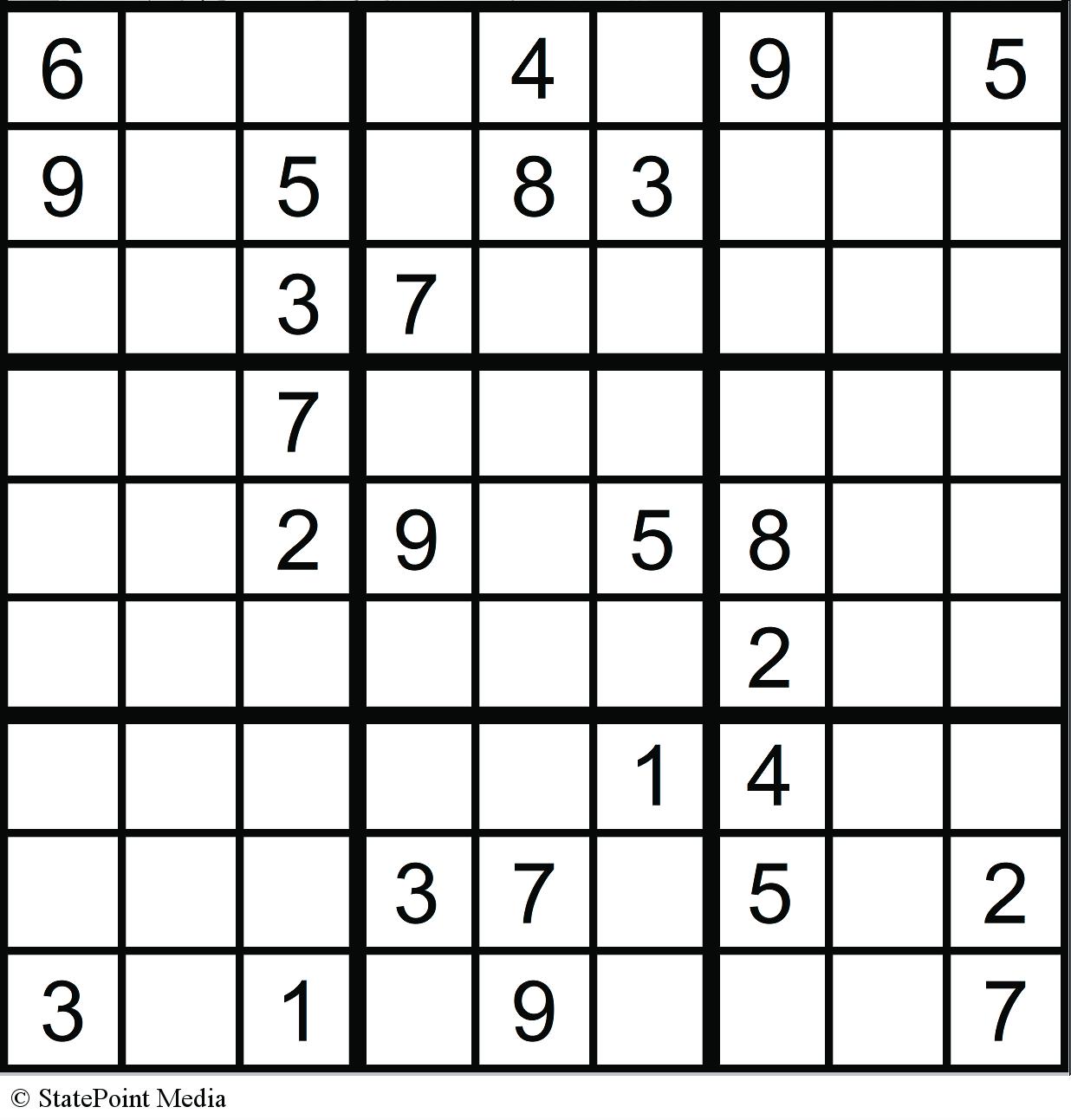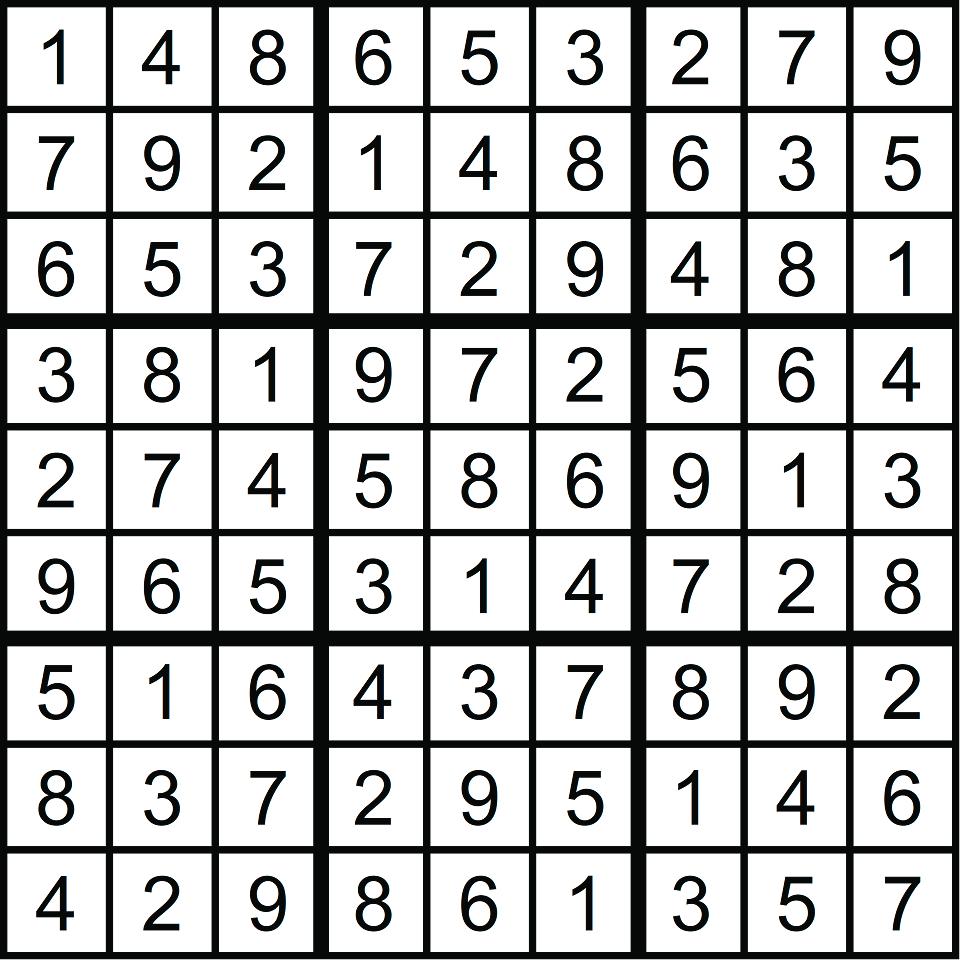







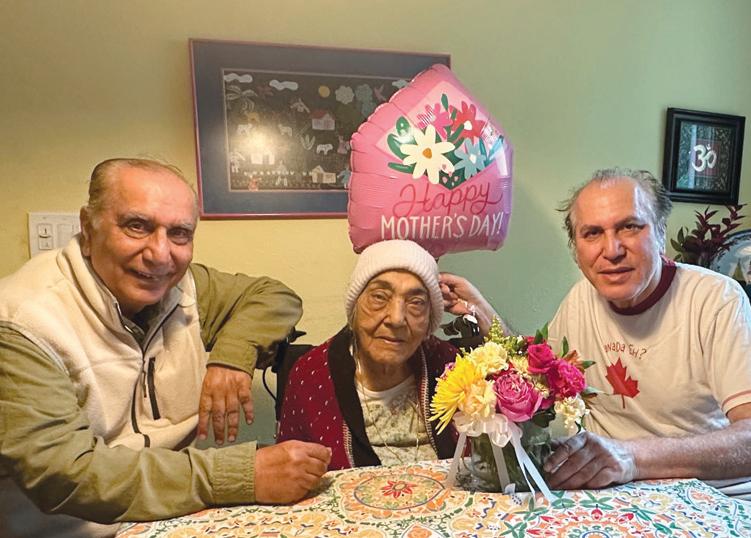












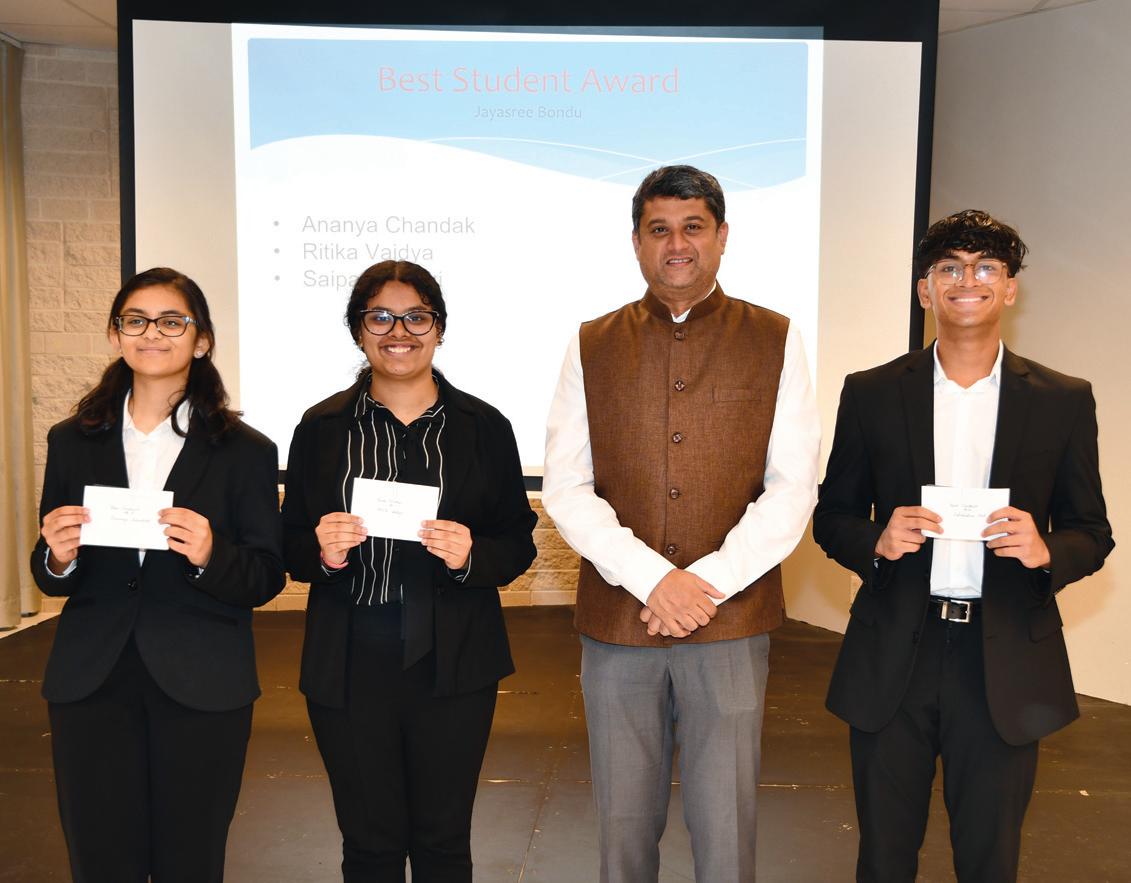
Houston: The Youth Leadership Development Program (YLDP) of Houston, a non-profit organization established in 2007 for Indo-American youth, recently held its graduation ceremony. The organization offers a comprehensive curriculum that includes classroom sessions, service projects, volunteering, networking events, meant to provide students with real-world industry experiences and opportunities.
The ceremony commenced with an encouraging message from the Chairman and Vice Chairman, who provided profound insights to the students: “Our journey is defined not by the obstacles we encounter, but by the path we choose to navigate them.”
Following this, the President gave a brief overview of the year’s YLDP activities, including class sessions, service and volunteering projects, and timely submission of essays. This year’s class comprised 11th and 12th-grade students from 17 different high schools across the Greater Houston area. Many students were recognized with special awards and accolades.
YLDP Houston also had the great honor of hosting the esteemed Chief Guest, D.C. Manjunath, the Consular General of Houston. The Chief Guest shared his leadership journey and explained the connection between philosophy and leadership. His presence and insightful words provided great motivation to the students, parents, and volunteers present. YLDP has equipped the students with the skills and knowledge needed to navigate college and the real world. As they embark on their new journey, they are encouraged to keep their eyes on the horizon and remain committed to their aspirations to serve their community. The future holds endless possibilities for them to achieve and cherish.
Graduation director facilitated the award ceremony by explaining the graduation criteria like completing all the sessions, service/volunteering projects, submitting essays on time, students were required to prepare leadership topic and lead a group presentation. She also explained the method of recognizing best students of the year award and selected students whose articles were selected as best essays to publish in local newspapers.
After the award ceremony, students presented their favorite sessions of the year and their key learning moments. They shared feedback for the continuous improvement of YLDP Houston. These students are also committed to staying connected through the YLDP Alumni network. We wish them all the very best in their future endeavors and look forward to seeing the incredible things they accomplish.
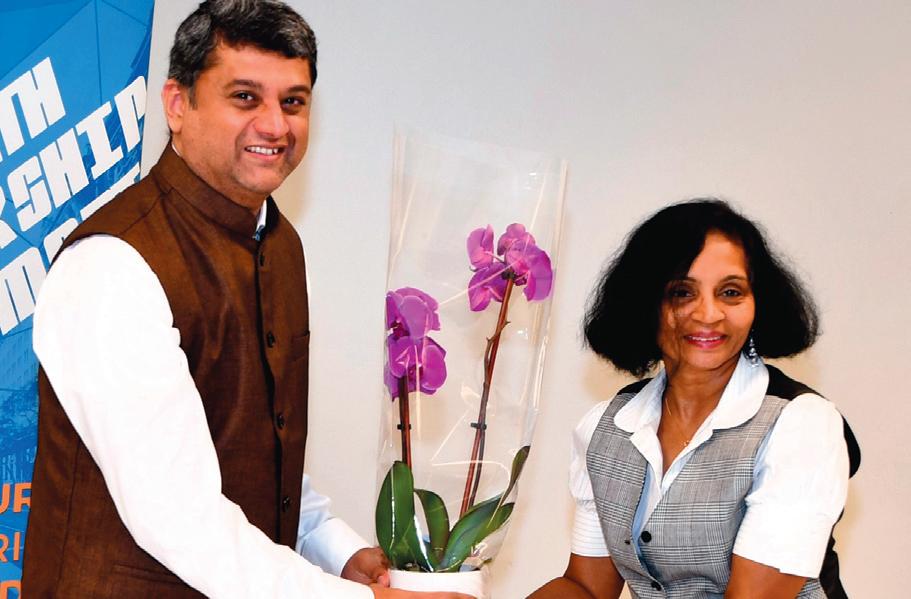
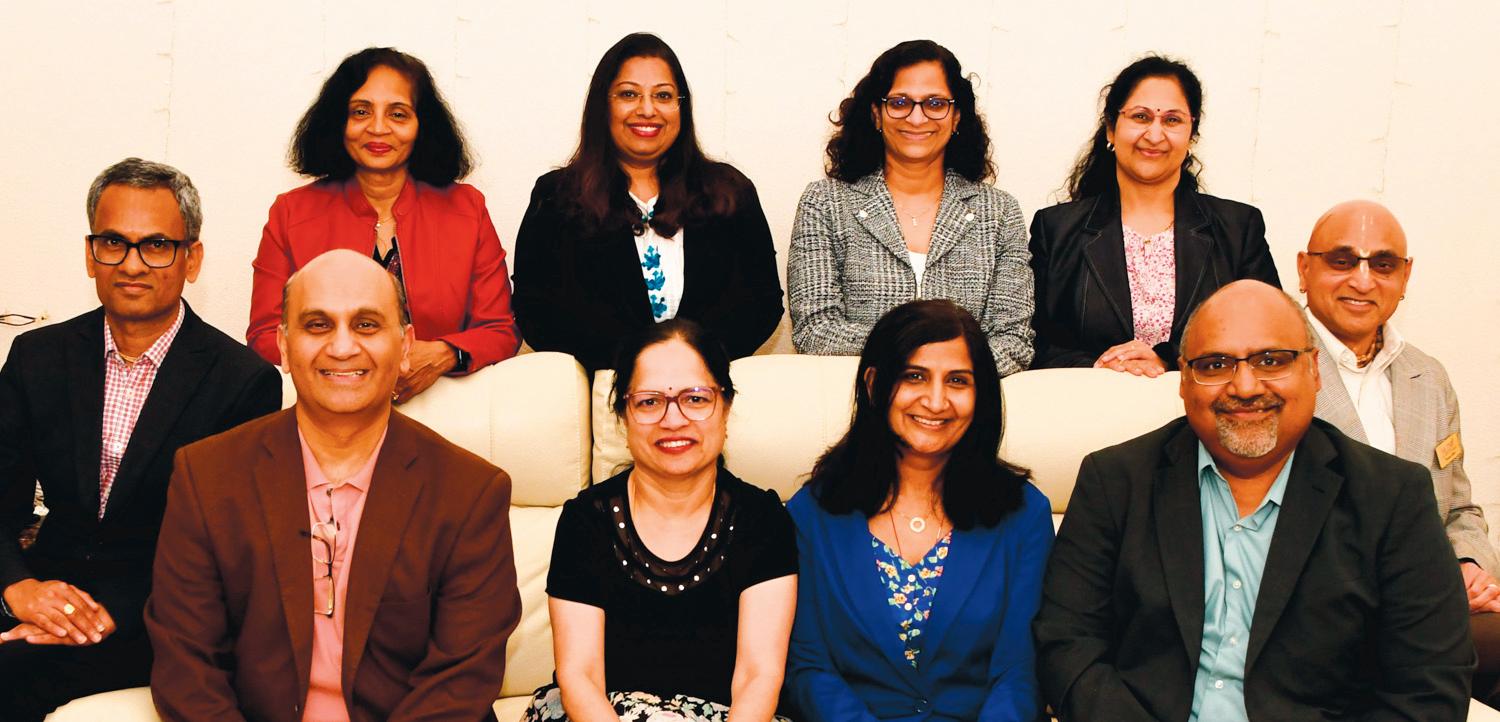

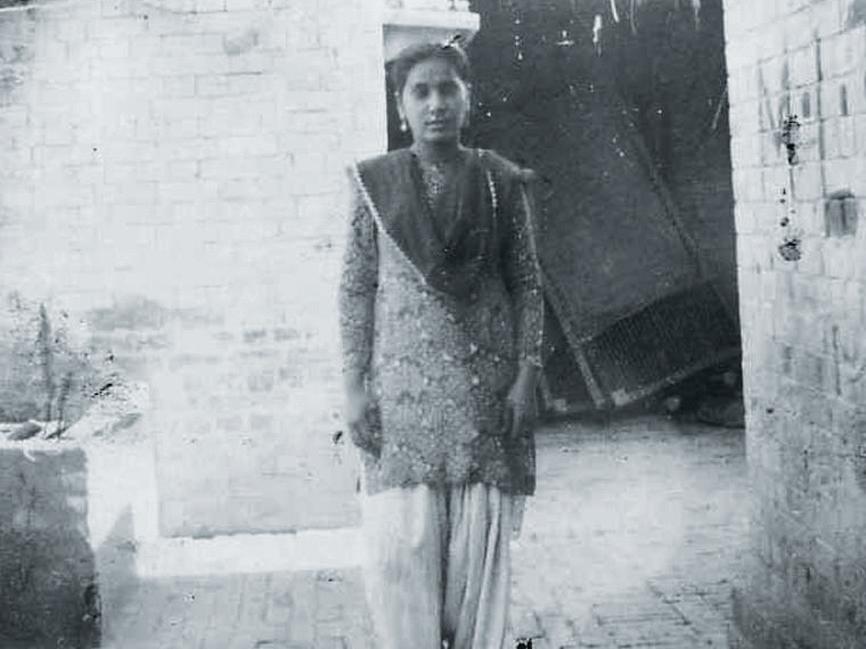
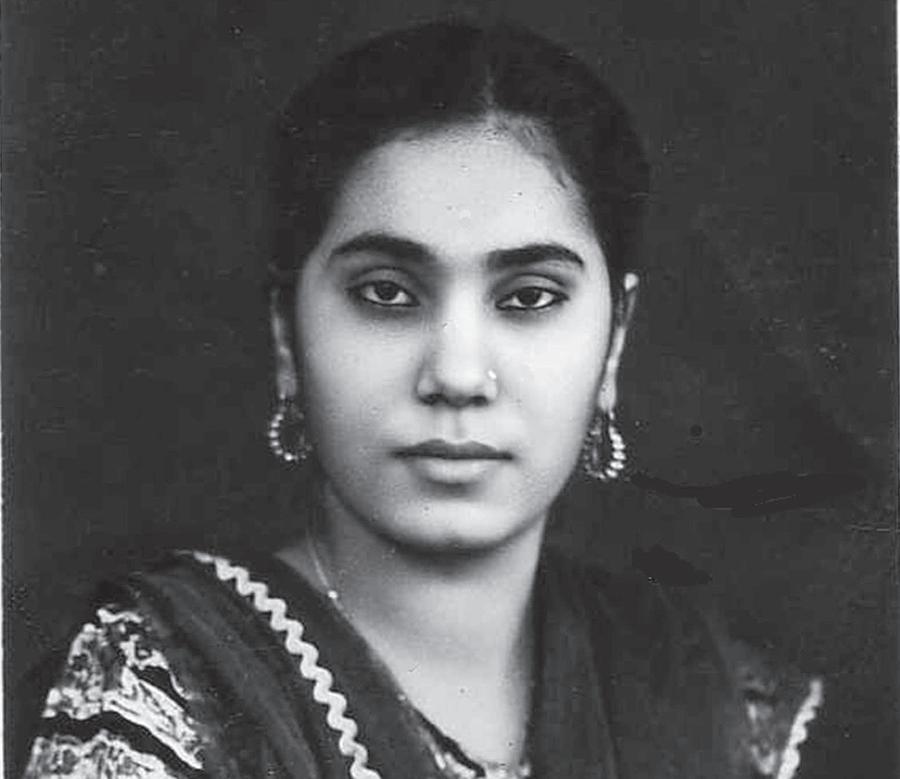
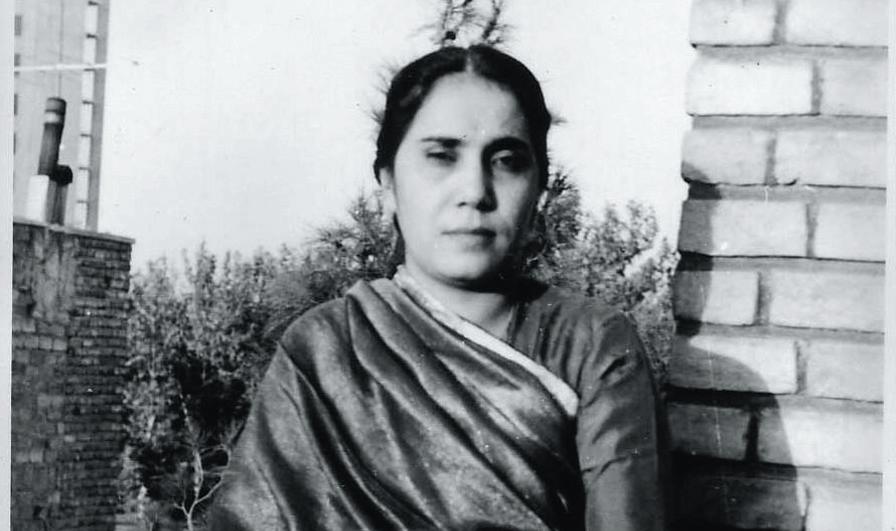 By JawaHar MalHotra
By JawaHar MalHotra
Houston: She never forgot the ancestral homes in Jhang and Lyallpur she grew up in and especially the galli mohalays where her grandfather’s large joint family lived in a house with a central compound where on one side there was a shed for the cows and another for the stacked charpies. On one side of the property wall was a Anglical church and the British priest would often shoo away people in heavily accented Punjabi.
Shakuntla Malhotra was a true Daughter of the Punjab as she often recalled how the family had lands where tenant farmers grew crops and how the produce was divided among the families. In her last days, she recalled her life there where her beloved dadaji Mastan Chand Mehra was a well-respected District Commissioner of Lyallpur and her father, the tall, handsome Sundar Lal Talwar worked at the Chenab River dam.
It was with these thoughts in her mind that Shakuntla Malhotra – who had become Mama to all – slipped away peacefully in her sleep on Thursday, May 23, 2024 at 5:17 am in her home in Houston, with her two sons by her side, as her weakened kidneys finally gave up on her.
Mama was just 19 years-old when her whole pastoral life col-
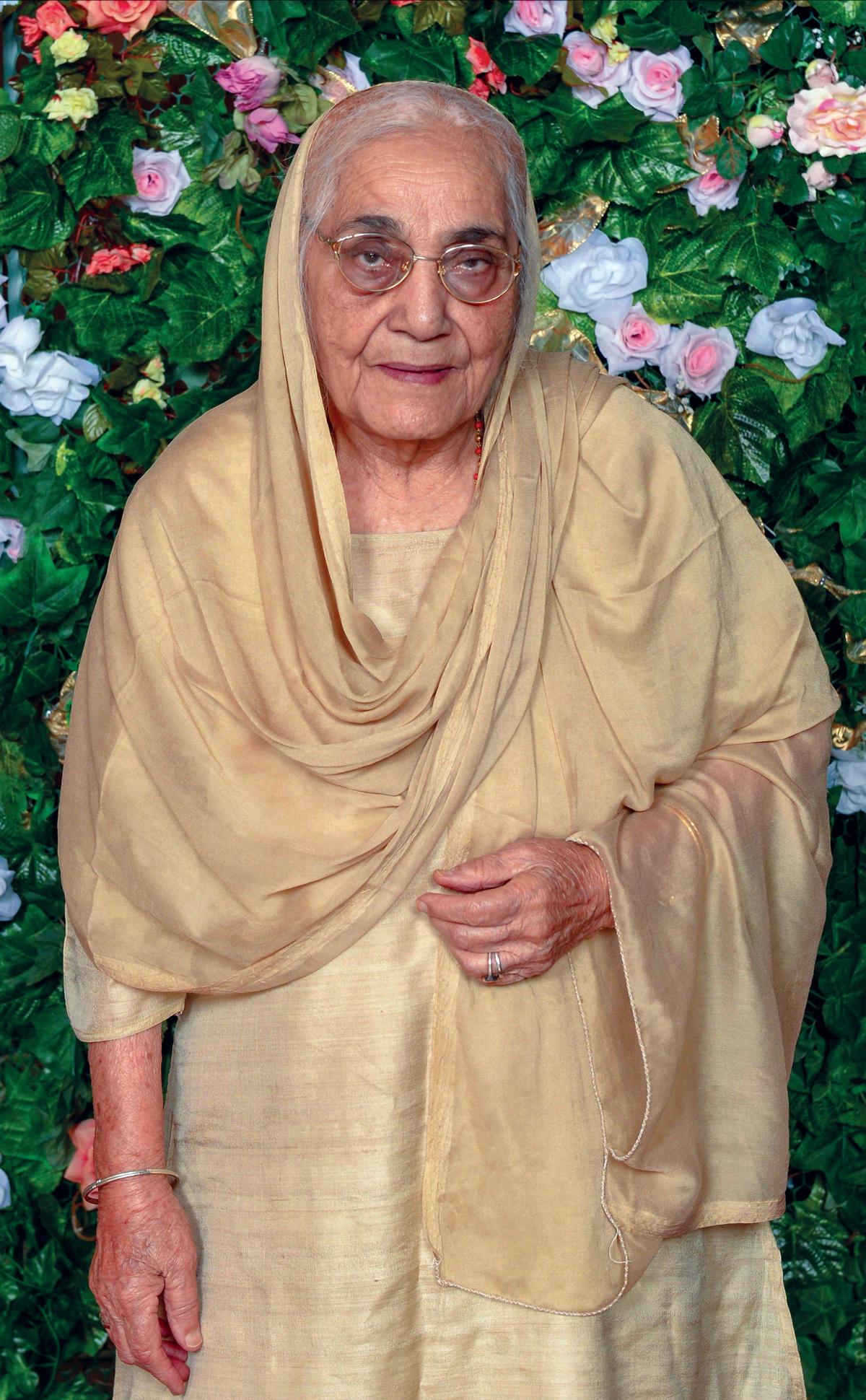
lapsed in violence and flames as India erupted in the hatred fueled by the Partition.
She managed to ride a military convoy to Lahore, waited for a train for three days and was flung into a third class cabin through the window by her cousin Mohan. She sat on the luggage rack clinging to a small metal trunk full of the family jewelry and reached Delhi where her husband, Jagdish Chander Malhotra, had landed a job in the Ministry of Information and Broadcasting.
In Delhi, her husband’s family took over a one bedroom flat and 35 people lived together. Mama recalled doing the cooking and sewing all their clothes. “There was no shame at doing even menial jobs,” mama remembered, “we all pulled together to get back on our feet.”
It was in these circumstances that Mama learnt her skills for adaptability, self-reliance, hospitality, congeniality, sacrifice and a nascent knack for business, skills which helped her throughout her life and which she passed along to her sons, Jayant and Jawahar. She was also had a fine mastery of embroidery, crocheting with beautiful pieces that adorn many tables and knitting: she made many sweaters, mufflers and blankets which are so treasured by those who received them.
As her husband joined the na-
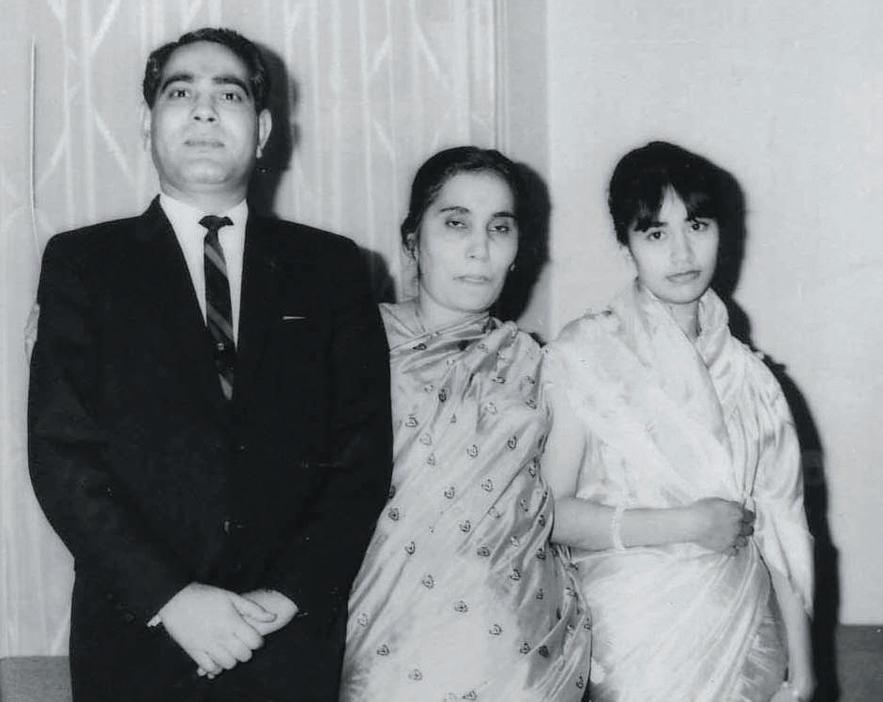
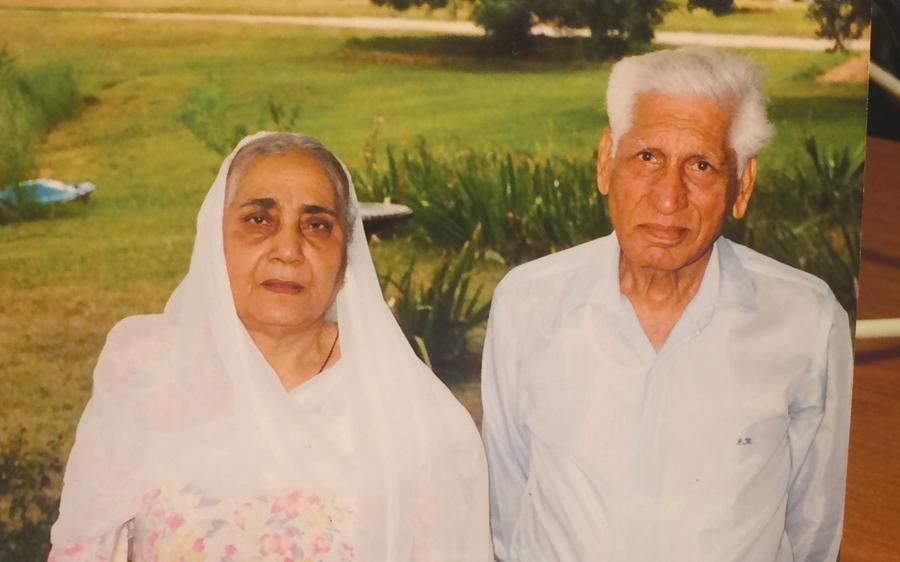
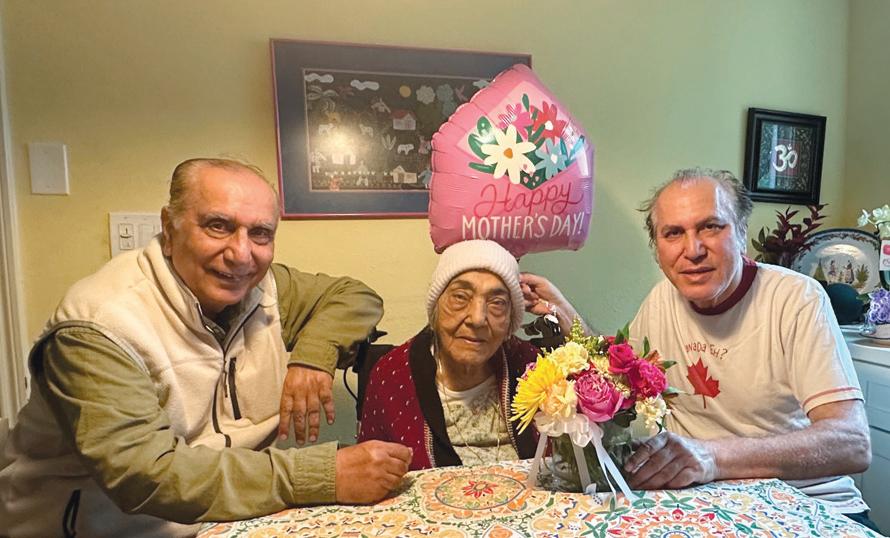
scent Indian Foreign Service, these two stages of her life closed behind her and she traveled the world for the next 25 years as the wife of a Diplomat.
The young woman who had only completed Metric or 10th grade, quickly learnt English and the art of being a hostess at parties in London where her life blossomed and she even started a small contract curtain-sewing business. From there, the family was transferred to Karachi, Pakistan; Teheran, Iran; Bern, Switzerland; Bucharest, Romania and finally Kabul, Afghanistan before papaji reached the mandatory retirement age 55. He went on to become the General Manager of the Plaza Cinema in Connaught Place, New Delhi, well into his late 70’s.
The horror of the Partition had taught them to be thrifty by nature, and in 1960 the couple managed to sell mama’s gold bangles and buy a plot of land in the new colony of Rajouri Garden, New Delhi where they built their home in 1962. After retirement, they entered the fourth stage of their life in their home at V-47 Rajouri, and as the colony grew tremendously, added two floors to the house. Using her enterprising skills, mama started renting of the bottom floor as a shaadi ghar business. Her older son Jayant was married to Shashi in Delhi and her younger son
Jawahar was married to Claudine in the huge vacant lot catty-corner from the house.
When her husband died on Tuesday, February 23, 2003, at the insistence of her sons, mama sold the beloved house in Rajouri and a year later moved to the US to begin the fifth stage of her life. Though it was extremely painful to give up the home she had built from the ground up, and the transition took a year to complete, in 2004, mama moved to be with her sons – a few months with Jayant in Chicago and the cold and winter months in Houston.
As her son Jawahar was involved in the media, mama found another outlet for her tremendous energy and gradually lived year-round in Houston. As she was a gifted natural cook, Jawahar encouraged her to write Punjabi recipes which were printed in the community weekly, Indo American News, for three years and are still on the website.
She also was much sought out for her reminisces of the Partition and was a fixture at community events on weekends and was a devout Hindu. Very soon, she became everyone’s “Mama”, and for the past 15 years, Jawahar had a huge annual birthday celebration for her.
Mama endeared herself to everyone with the same qualities that
helped her survive during the Partition and the all-embracing love and grace that her persona exuded. Her affection became legendary as she showed her caring and broad smiles of recognition to all she met. As she slowly aged and went from being able to walk alone, to using a cane, then a walker and finally a wheelchair, mama’s zest for life was remarkable and her blessings were always eagerly sought out.
In addition to her sons Jayant and Jawahar, mama is survived by her granddaughter Meena (Dan) Murphy and her kids Shashi and Shiva all of Chicago, Illinois; grandson Sanjay Stefan (Alexandra) Malhotra and his kids Camille and Remi of Houston, and grandson Jeremy Gyan (Kathryn) Malhotra and his kids Theo and Julian all of Washington, DC.
She is also survived by her sisters-in-law Mohini Talwar of Anchorage and Tara Talwar of Washington, DC; and brothers-in-law Bhushan Malhotra of New Delhi and Ramesh Malhotra of Faridabad and their families; many nieces and nephews; and an extended family scattered across New Delhi, Bombay, Bangalore, Meerut, Bhopal, Jullunder, Shimla and Chandigarh in India; in Canada and Australia; and in the USA in Chicago, Houston, Dallas, Milwaukee, New York, Seattle, Anchorage, Washinton DC, Charlotte and New York.
Houston: Under the spiritual guidance and presence of Samani Arjav Pragyaji, and Samani Swati Pragyaji, Jain Vishwa Bharati (JVB) Preksha Meditation Center, Houston celebrated Akshay Tritiya, Varshi Tap Parna of its member Mukta Jain, and Mother’s Day on May 12, 2024, in its beautiful pyramid hall. Two Samanijis from Orlando, Samani Chaitanya Pragya ji and Samani Him Pragya ji traveled to Houston, to be part of this unique and pious celebration. In parallel, a Blood donation drive was also organized at the center in which several members donated their blood to save lives.
The festival of Akshaya Tritiya holds special significance for Jains, as it’s the day when Lord Aadinath or Rishabhdev, the first Jain Tirthankara, ended his 400 days long fast. On the day of Akshaya Tritiya, a shravak (an adherent of Jainism) named Shreyans Kumar offered Lord Adinath Ikshu juice or sugarcane juice which ended his rigorous fasting, hence immortalizing the festival for Jains.
What is a Varshi Tap? As a 400 day fast is no longer possible in the modern world, in current times, Jains now follow a Jain fasting regimen that stretches across thirteen months, where the individual establishes a cycle of alternate day Jain fasting & eating. Every year, Akshay Tritiya day is considered the day when persons undertak-
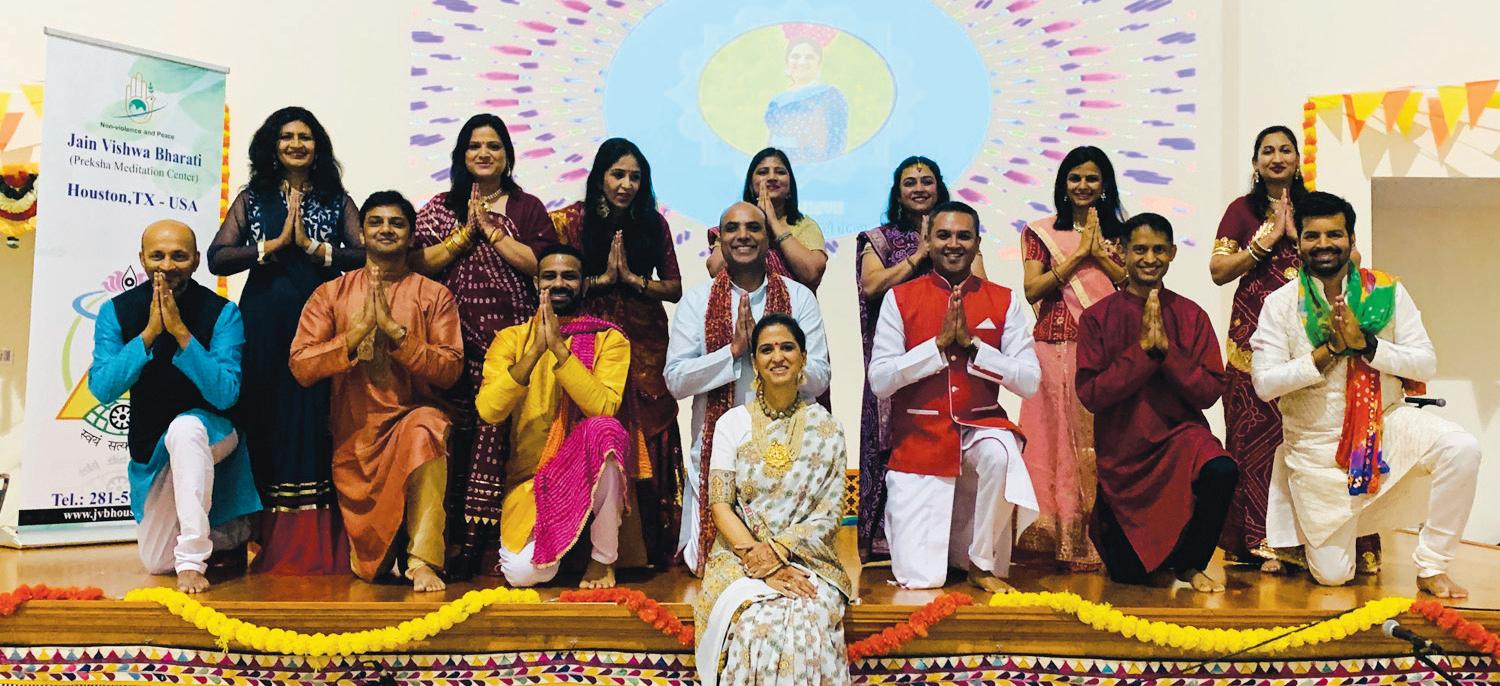
ing this regimen are applauded for their achievement by the community, and they can slowly get back to their normal eating habits.
JVB Houston’s very own member of 23 years, Mukta Jain, undertook this regimen over the past year, and all the members, & many friends were in attendance on the day to celebrate her tapasya. The program started at 10 AM with a procession to lead Mukta to the center where a group of over 25 ladies danced in the foyer and welcomed her with a few beautiful song and dance sequences signifying her long penance. She was then led into the main hall under slanting raised hands where everyone blessed her as she walked through.
Orlando Samaniji Chaitanya Pragya ji thereafter, formally
initiated the program with the Namokar Mahamantra & the emcee Priyanka Jain invited Mukta’s daughter Sanemi to recite the 44 Bhaktambar Stotras. Sanemi, a recent UT McCombs graduate, recollected how learning this Strotra was a special bond she shared with Mom when she had memorized it at the young age of 10, with her Mom’s help, and now she was going to sing it for her. She was accompanied by Nishad Kanhere on Tabla, Harprakash Kaur on Harmonium, Sardar Akaal Singh Ji on Manjeera & her brother Sambhav Jain on the flute. Dipti Kanhere was the musical co-ordinator. Thereafter, Mukta’s sister Bhanu who had specially flown in from India along with their parents spoke about Mukta’s achievement even though she was her young-

est sibling. Mukta took the microphone and shared her thoughts & feelings over the past year in beautiful poetic fashion, which left many extremely emotional & in tears.
Priyanka then called upon the JVB patrons for two beautifully choreographed dances with song lyrics signifying & highlighting Mukta’s fasting. After that, JVB Gyanshala’s young kids aged 4 to 12 performed a beautiful skit entitled ‘Who am I?’, which was coordinated and voiced over by Samani Swati Pragya Ji. The young cast was wearing animal masks throughout the skit and kept the audience mesmerized watching them.
After all the cultural activities concluded, Samani Chaitanya Pragya Ji recounted the story &
the importance of Akshay Tritiya and importance of the Varshi Tap, and encouraged Mukta & others. At this time JVB president Gaurav Jhaveri requested Mukta’s family to say a few words. Shashank Jain, Mukta’s husband & also a JVB Director took a few minutes to thank everyone for coming for this special recognition of Mukta’s achievement, and recounted a few personal incidents over the past year while Mukta was fasting. This concluded the first part of the program with the recitation of Mangal Paath by Samanijis.
Thereafter, the Parana (breaking the fast) program started with Mukta offering sugarcane juice to Samanijis, and then Mukta’s son Sambhav helped break her fast auspiciously with sugarcane juice in a small ceremony led by Mukta’s parents & in-laws. The entire congregation then lined up to feed Mukta sugarcane juice to signify her completion of the fasting regimen, one family at a time. Her family presented a small gift to all families, and sponsored a sumptuous lunch for everyone to celebrate her achievement.
Jain Vishwa Bharati (JVB) Preksha Meditation Center is home to a specially designed Preksha Dhyan ‘Pyramid’ Meditation Hall and is located at 14102 Schiller Rd, Houston, TX 77082. For more information and current & upcoming programs please visit www.jvbhouston.org or call 281.596.9642

Houston: The Bala Vihar program in Chinmaya Mission Houston (CMH) - popular since 1982 for teaching students the cultural values of Hindu scriptures and Vedanta - reached another milestone when its latest batch of students, the Class of 2024, graduated. To honor their achievements and flag off a new chapter in their lives, CMH had organized a grand graduation ceremony.
On the morning of May 18th, Dr. Sameer Sheth, a Bala Vihar alumnus and parent of a graduate of the Class of 2024, recalled memories from 30 years ago when the beautiful tradition of Bala Vihar graduation ceremony began. The teachings of mindfulness and meditation ingrained through Bala Vihar would help the graduates navigate college and beyond, just like it had done for the assembled CMH alumni.
To usher the graduating students into the new era of higher education, CMH’s Acarya Pujya Gaurang Nanavaty lit the main Diya(lamp) inviting the brilliance of knowledge into the Smrti Hall. He congratulated not just the Bala Vihar graduates, but also their teachers, parents, and families who played an integral part in their upbringing. He reminded them
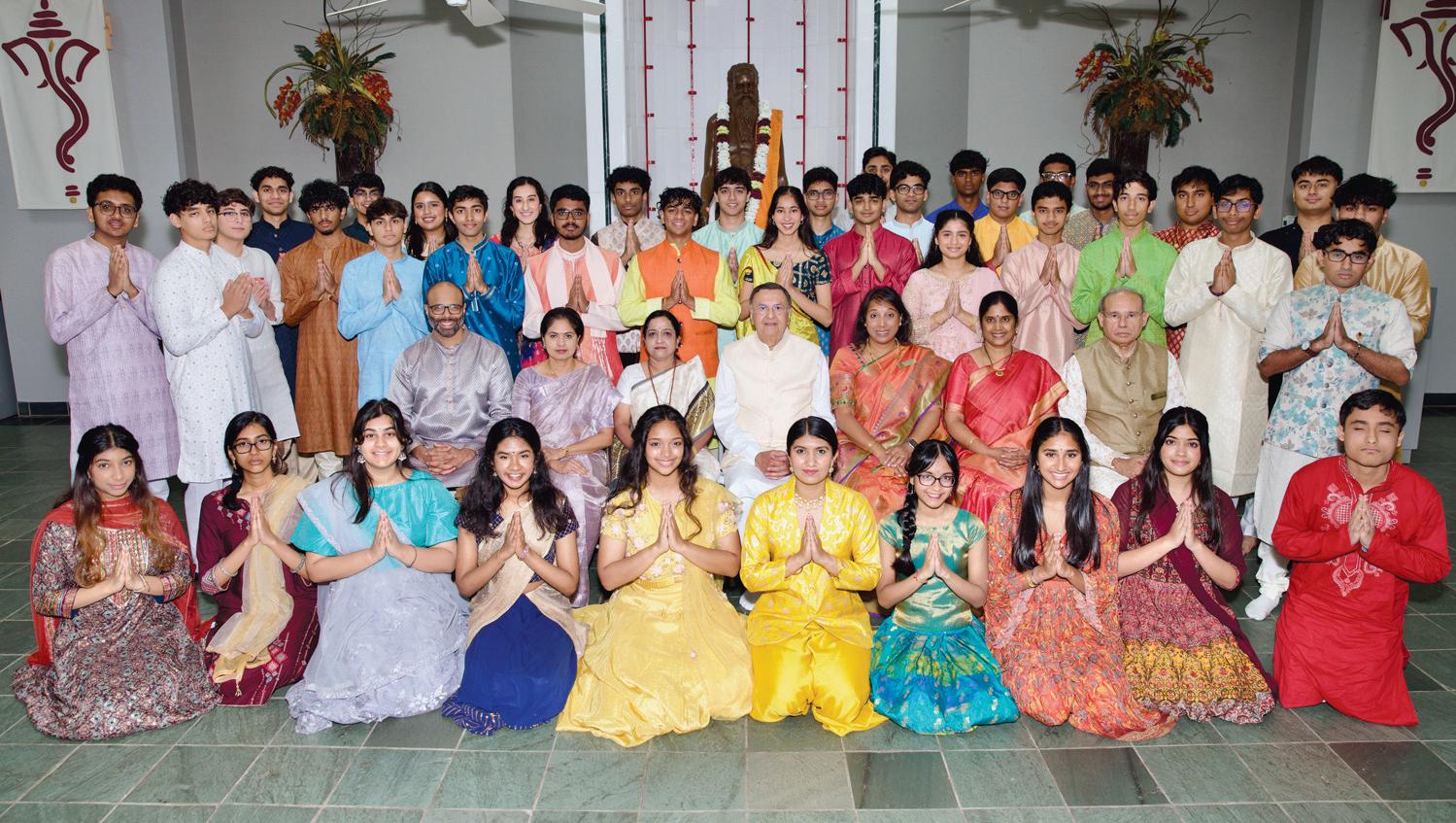
that Chinmaya Mission follows the ancient Gurukula tradition of students living from early childhood under the guidance of their Guru before embarking on their own paths at the age of 18.
As the powerful words of the scriptural convocation address beginning with “Satyam Vada, Dharmam Chara” resounded through the hall, Pujya Gaurang Uncle distilled its powerful essence to always living by truth and one’s duty.
He asked all to reflect through
regular self-study (Svadhyaya) urging students to respect, support, and reciprocate in goodwill to all teachers who taught them. He highlighted the reverence behind “Matru Devo Bhava, Pitru Devo Bhava, Acarya Devo Bhava.”
The Chief Guest, Dr. Chitra Banerjee Divakaruni, the awardwinning author and professor of Creative Writing at University of Houston (UH), spoke about her early experiences with Pujya Gurudeva Swami Chinmayananda
during her graduate school in Northern California. She shared key quotes of Pujya Gurudeva and recalled how Pujya Gurudeva’s health problems vanished during his discourses with the power of Gita. Dr. Chitra Divakaruni asked the Bala Vihar graduates to stay connected with the Gita that they had learned in the final two years of their Bala Vihar curriculum.
Then, Pujya Gaurang uncle returned honored the 40 Bala Vihar graduates of the Class of 2024. Each graduate received a book, a
trophy, and a gift bag holding their Japa Mala and their Bala Vihar journal called “the little fat book.”
A new scholarship fund, established in the memory of beloved Pujya Darshana Aunty, awarded its first merit scholarship of $2501 to Haley Dave for her dedicated attendance, volunteerism, and faithful learning of Vedanta. Keeping with the spirit of Gurukula tradition, the Class of 2024 then offered Guru Dakshina to Pujya Gaurang Uncle and CMH, a contribution toward the Darshana Nanavaty Memorial Fund. A noteworthy presentation of the Class of 2024 titled an “Ode to Pujya Darshana Aunty” which summarized the comprehensive, worldwide pre-K to 12th grade Bala Vihar curriculum that she had envisioned, moved the audience, especially the Bala Vihar teachers
The memorable, beautiful graduation ceremony concluded with a lunch served with love and respect by the graduates and their families.
For more information about Chinmaya Mission Houston, Sri Saumyakasi Sivalaya and its activities please visit www.chinmayahouston.org, www.saumyakasi. org or call temple 281 568 1690 or Jay Deshmukh 832 541 0059 or Bharati Sutaria 281-933-0233
by Bharat Rao.












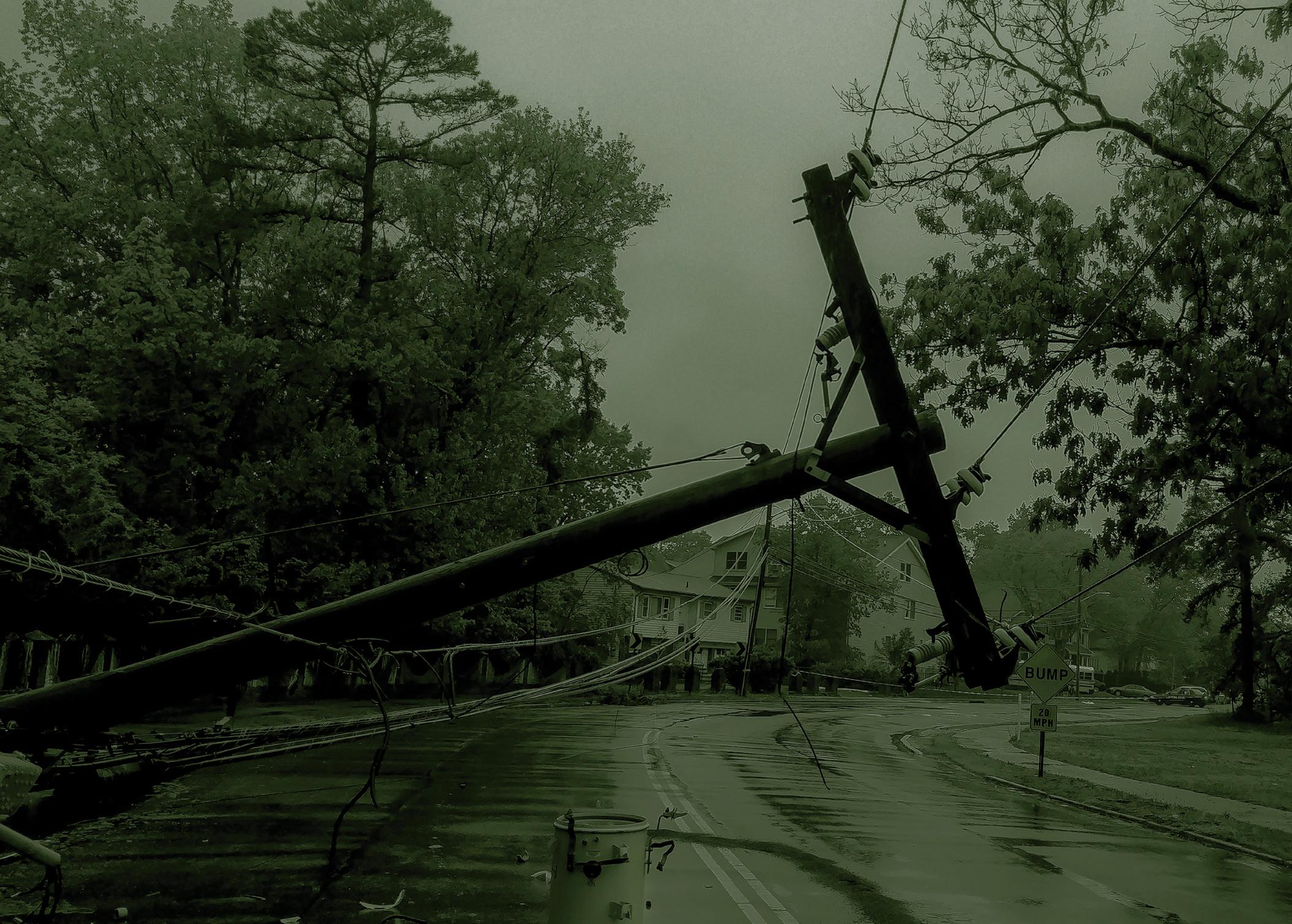
Houston: The Indian community in Houston lost a good friend in the passing of Tulsi Kewalramani on Saturday, May 25, 2024. Tulsi born and brought up in India, attended Sainik Boarding School in Jamnagar. He then went on to do Marine Engineering and sailed around the world on board cargo ships, as an engineer. Family pressures resulted in Tulsi settling down and joining the family business.
Tulsi soon married Shalini and the couple moved to Liberia in west Africa and spent 8 years living there till a coup toppled the government and political unrest forced expatriates to leave the country.
The Kewalramani family moved to the USA in 1990, and opened Maharani Music in 2001. This soon became THE store for all Indian music and movie lovers.
Tulsiji took a very active role in promoting Indian music of all genres and languages. When Music CDs took a downturn he started exploring different avenues and started Armonia Decor + Gifts, in
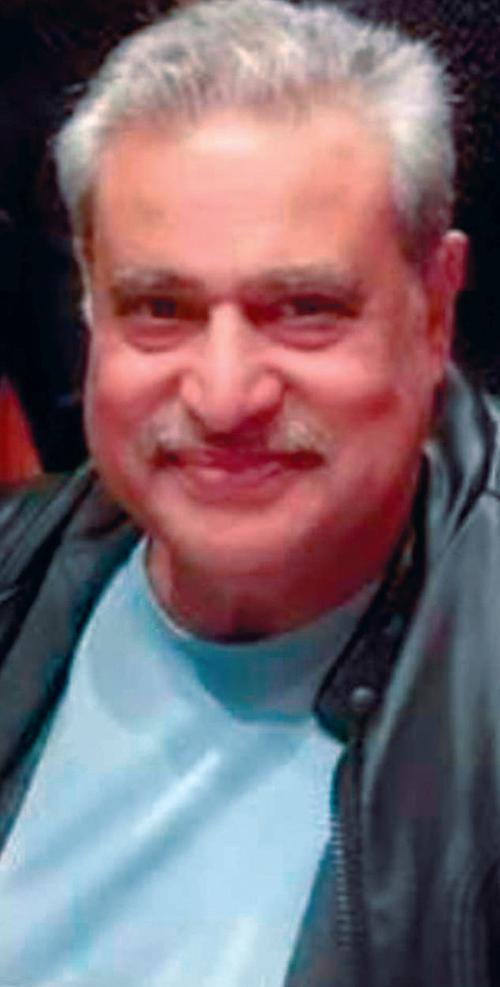
2023, which became his dream project.
Tulsiji was passionate about music and the arts. He was a longtime supporter of the Indo-American Association and served as it’s
Volunteer Outreach Coordinator. He was highly regarded by all and touched many lives with his kindness, generosity, and love.
In 2020 after a trip to India, he was diagnosed with pancreatic cancer but still wanted to complete his dream project and open the gift store. In spite of ongoing medical treatments, through sheer will power and determination, Tulsiji managed to set up the beautiful store and saw his dream project come to life.
Unfortunately, he lost his fierce battle with the cancer and passed away on May 25 th . He leaves behind his loving wife Shalini, his daughter Reshma, son-in-law Sanjan, grandsons Dylan and Devin, and sister and brother-in-law Bina and Rattan Hemrajani.
He also leaves behind his large circle of friends. The Armonia Décor + Gifts is his legacy. As we mourn Tulsi’s loss, we also celebrate his life and the lasting impact he had on all of us. Om Shanti.
Founder: dr. k.l. sindwani
puBlisHer: JawaHar MalHotra
editor: praMod kulkarni
Correspondent: sanCHali Basu
®All rights reserved. No material herein or portions thereof may be published without the written consent of the publisher. Deadline for advertising and articles is 4 pm on Monday of each week. Please include self-addressed, stamped envelope for return of all unsolicited material. Published at 7457 Harwin Drive, Suite 212, Houston, Texas 77036.Tel:713-789-6397, email: indoamericannews@yahoo.com, website:
new delHi: The extremely high temperatures recorded in New Delhi in the last two days are extraordinary. But they are in keeping with the global trend in the last couple of years that has seen record-breaking temperatures being reported from several locations across the world.
For example, the United Kingdom crossed 40 degree Celsius for the first time ever in July 2022.
A small town in China’s northwest recorded 52 degree Celsius last year, the highest ever for that country. In 2021, Sicily in Italy recorded 48.8 degree Celsius, the highest for Europe ever. These are just a few examples.
An analysis by Carbon Brief, a UK-based publication focused on climate change, last year showed that nearly 40% of the Earth had recorded its highest-ever daily temperature between 2013 to 2023. This includes places in Antarctica as well. The highest temperature in India, in Rajasthan’s Phalodi, was also recorded during this period.
However, the highest ever tem-
perature recorded anywhere on Earth, 56.7 degree Celsius in Death Valley in the desert of California, United States, was recorded more than 100 years ago, in 1913.
If the 52.9 degree Celsius recorded at one of the stations in Delhi on Wednesday is verified, it would be an all time high for India. But as of now it is suspect. The India Meteorological Department (IMD) said it was checking the authenticity of the reading by an automatic weather station in Mungeshpur, located on the northern outskirts of Delhi, bordering Haryana.
The doubts over the Mungeshpur reading stems mainly from the fact that none of the other stations in Delhi recorded a temperature that was close to 52.9 degree Celsius. The maximum temperature in other stations of Delhi on Wednesday was recorded by the Najafgarh station, which gave a reading of 49.1 degree Celsius. The station that is taken to be representative of Delhi — Safdarjung — showed a maximum temperature of 46.8 degree Celsius. -- Indian Express




“Where are you really from?” is a question that Jhumpa Lahiri gets asked “all the time”. Yet the Pulitzer prize-winning author – who was born in London to Indian parents, moved to the US at the age of three and now lives in Rome – cannot answer it. “I don’t have that specific set of coordinates that mark me as who I am,” she said. “I have many pieces to myself.”
Appearing at the Hay literary festival in Powys this week, Lahiri, who writes in English and Italian and has translated her own work, said she thinks our global “obsession” with what is original or authentic is “very problematic”.
There are “so many variables” to how we live on this planet, she said. She sees her “mission” –both as a creative writing teacher at Barnard College in New York and in her books – is to get people
to question “what the idea of being authentic means and why we think this is so important”.
“I understand that we don’t want things to be false, we want things to be true, but then there’s the leap from authenticity to the idea of purity, and therefore, what is not authentic or pure is somehow corrupt, and that’s the danger zone,” she added.
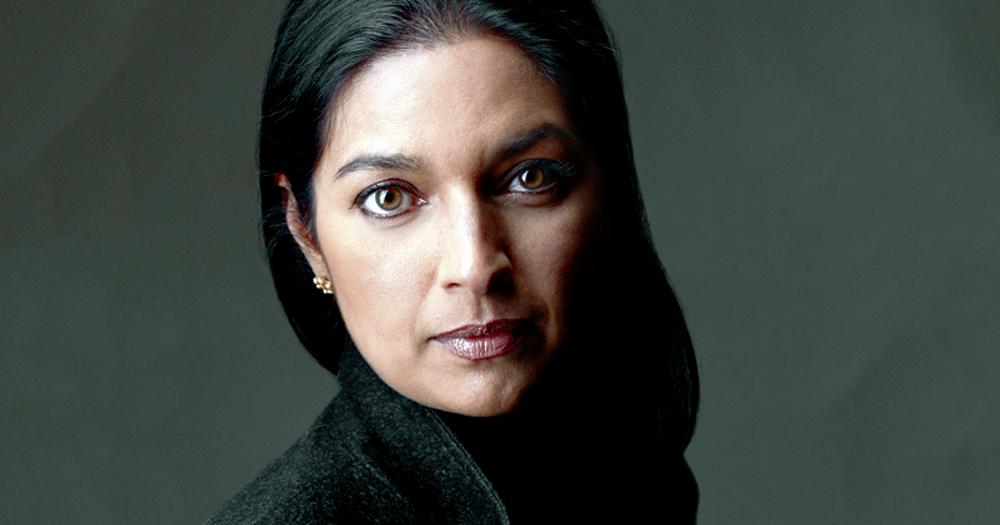
Lahiri thinks this focus on origin is partly responsible for “the fallout we’re seeing now” in Gaza and in the three countries she has connections with: India, Italy and the US.
“What does Make America Great Again mean? What is this
‘again’ that we’re talking about? What are we trying to get back to?” she asked. The rise of Donald Trump, growing support for the rightwing populist party Lega in Italy, and Narendra Modi’s “notion of what India is” are all examples of an “increasingly nationalist sentiment” that comes from “believing that you have, you know, some sort of non-negotiable right
to belong to a place”, Lahiri said. “I don’t believe that.”
“I’ve never had that claim to any place and I think that we should try to think about the fact that we really are all passing through,” she said.
A sense of
having a defined identity in a place “is understandable”, but the writer thinks it “is a potentially very dangerous way of thinking of ourselves and our world, because identity is not fixed, and rootedness should not be tied to things like language and place”.
Having such a strong attachment to where you are from, and con-
stantly wanting to identify where other people are from, can create a sense of xenophobia, she believes. “It boils down to two pronouns: us versus them.”
When people talk about “our land”, she said, they are often talking about land that was originally occupied by a different group of people. Having grown up in Rhode Island, Lahiri was taught to sing This Land Is Your Land: “There was complete negation of whose land it really actually had been,” she said.
“So much of history is built on states of exile”, “physical movement” and the creation of “homelands”, she said, adding that the emotional attachments we have placed on to this sense of place and belonging can “pervert our knowledge of what is actually the case”. -- The Guardian
“Yeh darwaze tak seemit hain, aur main kitchen tak jaati hun” (“He stops at the door, I can go up to the kitchen”), remarked a BJP Mahila Morcha adhyaksh, as we sat down to discuss her constituency’s booth management and doorto-door strategy back in 2013. This sentiment, highlighting the unique advantage women party workers have in reaching women voters, is one I have heard countless times in conversations with women workers from various political parties. Since 2012, I have engaged with thousands of party workers and observed numerous elections and campaigns nationwide.
Unlike most election observers and political scientists, who mostly talk to men, I have spoken with both men and women party workers. Each election cycle has revealed an impressive pattern: Women party workers are building stronger, more granularly developed party organisations that often extend from the district level down to the level of the booth. This trend is evident not just in the BJP, but across various parties, especially those successful in winning panchayat and municipal elections. What has captured my imagination is not merely the increasing turnout of women voters or the proliferation of pro-women welfare schemes. It is the rise of ordinary party women, the unsung backstage actors, who play a crucial role in shaping the political landscape. Their contributions, often overlooked, are integral to the success and dynamism of India’s participatory democracy.
Indian democracy has witnessed a remarkable phenomenon: Women’s electoral turnout has not only matched but surpassed that of men. Despite a slight dip in turnout in this election, the overarching trend

remains strong. This surge in electoral participation coincides with the endlessly growing list of distributive promises, including the recent passing of the women’s reservation bill in Parliament. Why are parties courting women? The rise of grassroots women party workers, or “party women” is driving this new era of women voter-party linkages.
Academic research and political pundits have largely ignored or, worse, caricatured these women as a token presence. However, the significant participation of women at polling booths and as campaign workers, coupled with gains in welfare schemes and gender reservation, has forced a reckoning. Traditional notions that Indian women voters lack agency or autonomy from family structures have been discredited. After all, why would parties promise welfare schemes to women if it were enough to speak to their husbands? Or why are women turning out in greater numbers and increasingly supporting the BJP? Turnout precedes electoral promises, indicating that women are not turning out because of these promises; rather, the promises are a response to
their increased turnout and political engagement.
What does my research suggest? Over the last three decades, since the 73rd amendment, women have not only run in but also won panchayat and municipal elections. To stay electorally competitive and upwardly mobile, these ambitious women have strengthened local party organisations. This has ended the era when women’s party wings were led exclusively by elites.
A glance at any party’s Mahila Morcha banners reveals this transformation. Today’s women’s wings include district heads, ward adhyakshas, booth-level managers, and panna pramukhs — with significant variation within and between parties, time, and space. Women who contest elections rely on these loyal party workers, often more so than their male counterparts, as it is typically easier for women to claim credit for mobilising fellow women. Motorbike rallies organised by women party workers — one of the few women party events that make media headlines — exemplify how women claim credit and secure party tickets in the run-up to elections.
How does grassroots organising by ordinary women party workers explain the gender shift in India’s politics? Consider voter turnout: India boasts some of the most robust door-to-door campaigns, with nearly 60 per cent of voters contacted by party workers each national election as measured in post-election surveys. Until 2009, men dominated campaign mobilisation, primarily reaching male voters. Since then, thanks to two decades of quota elections and effective grassroots organising, women campaign workers have increasingly taken on voter mobilisation roles. By entering households, they have reached both men and women more equally. These efforts have revealed the untapped potential of the women’s vote, prompting parties to make targeted electoral offers to woo women voters. These distributive offers are a direct result of the labour of women’s party workers. Beyond elections, women party workers organise countless events, ranging from planting drives to dharnas and seva abhiyans, mobilising women from a range of social groups such as Self-Help Groups (SHGs) and Anganwadi workers for party activities, and keeping them engaged in politics between election cycles. Availability of administrative data on turnout offers clearer insights into election participation, however women’s participation also tran-
scends the polling booths. We are witnessing women’s unprecedented involvement in protests, with the recent farmers’ protests being a prime example.
What explains the rising BJP advantage among women voters? The BJP has benefited the most from increasingly vocal women voters, partly because its women’s wing is the strongest, most granular, and active. BJP party women have played a major role in mobilising women as an electorate because the party offers them more opportunities to rise in the ranks and build careers, especially if they lack dynastic or wealth power. Other parties’ inability to offer opportunities has hindered their ability to attract and select women candidates who can develop strong grassroots organisations. Tragically, no party offers real opportunities to women, but the BJP has fared relatively well. Additionally, the BJP offers a mix of religious ideology and patriotic narrative that helps Hindu women overcome social and family barriers to join the party.
In addition to counting heads and welfarism, the act of gendered credit claiming will play an increasingly central role in shaping party-voter linkages in India, a trend that will deepen with the implementation of gender reservation in Parliament. Is the growing participation of women a force that strengthens India’s democracy, or does it exacerbate its democratic decline? What is evident is that women’s political agency is indispensable to India’s democratic future. -- Indian Express
The writer is Assistant Professor of Politics and International Affairs at the Department of Politics and the School for Public and International Affairs at Princeton University
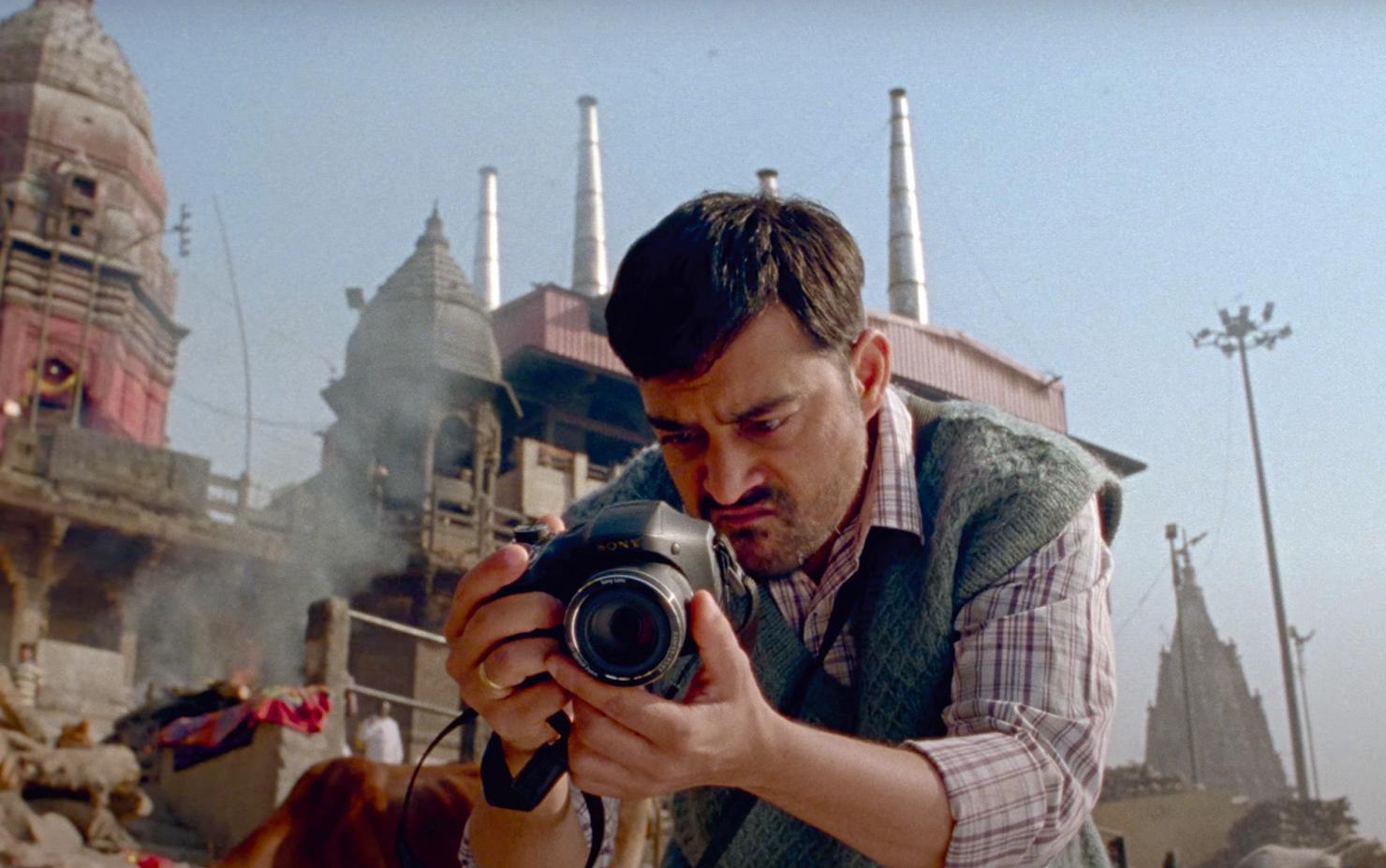 By dHaval roy
By dHaval roy
Story: A “death photographer” (capturing the deceased’s final image before cremation) grapples with life’s impermanence at Varanasi’s Manikarnika ghat. As his profession fades with the rise of smartphones, he faces the loss of meaning in his work but also the potential need to migrate for a more secure future.
Review: The poignant drama by writer-director Gaurav Madan and co-writer/cinematographer Sunny Lahiri explores life’s impermanence through a death photographer Sooraj’s (Gyanendra Tripathi) lens.The duo excellently captures the ancient town’s essence, translating its slowness into the narrative’s deliberate pacing. Without constant background music or dialogue, the film unfolds quietly, allowing viewers to contemplate the deeper themes.
The movie’s power lies in its subtle storytelling. Despite internal conflict brewing beneath the surface, Madan and Lahiri weave a narrative that unfolds with quiet intensity. Sooraj’s wife, Meena (Bhumika Dube), is supportive yet grounded and recognises the need for change. His sister, Mansi (Geetika Vidya Ohlyan), has moved to
Delhi, creating a rift between her and their father, Parbat (Harish Khanna). None of this is conveyed through loud dialogues or scenes. All the characters are on the cusp of change in some manner. Sooraj moves on to photographing weddings and the living; his friend Dubey (Akash Sinha) wants to give up visiting a brothel and tie the knot and find a job after taking the narrow lanes of Kashi as a protestor. The terminally ill Parbat may break on through to the other side, and Mansi is set to be married.
Pay close attention to the various cameras used throughout the film, hinting at the changing times and Sooraj’s transition. In one scene, a photographer slinks his compact digital camera into its sleeve, Sooraj uses a DSLR, a man clicks
his relative’s arthi’s photo on his smartphone, and a professional photographer, Tathagata (Aashit Chatterjee), captures the world on his tele lens.
The actors perfectly capture the restrained vein with their understated performances. Gyanendra Tripathi and Bhumika Dube stand out as a gentle couple deeply in love and appreciative of each other. Geetika Vidya Ohlyan, as an independent woman and a loving sister, is powerful. Harish Khanna, as a traditional man, delivers an impactful performance.
While the film’s pacing and lack of flashy visuals might feel slow for those seeking fast-paced narratives, it rewards patient viewers with a meditative exploration of change, mortality, and family dynamics..-- TNN

Place a number in the empty boxes in such a way that each row across, each column down and each 9-box square contains all of the numbers from one to nine.
Send us the correct answer before June 5, 2024. Email us at indoamericannews@yahoo.com. Please send us your solved Sudoku for your name to be published.
